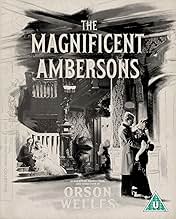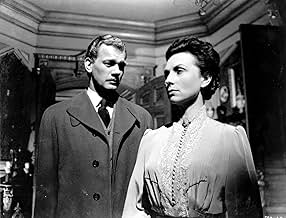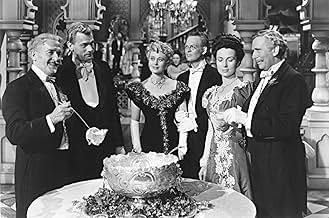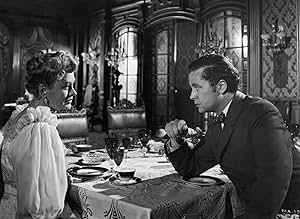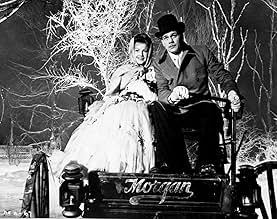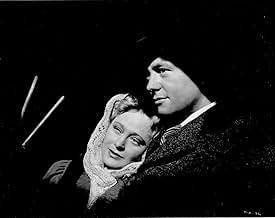VALUTAZIONE IMDb
7,6/10
28.067
LA TUA VALUTAZIONE
Il giovane erede viziato della decadente fortuna di Amberson si trova tra la madre vedova e l'uomo che ha sempre amato.Il giovane erede viziato della decadente fortuna di Amberson si trova tra la madre vedova e l'uomo che ha sempre amato.Il giovane erede viziato della decadente fortuna di Amberson si trova tra la madre vedova e l'uomo che ha sempre amato.
- Regia
- Sceneggiatura
- Star
- Candidato a 4 Oscar
- 8 vittorie e 4 candidature totali
Orson Welles
- Narrator
- (voce)
Edwin August
- Citizen
- (non citato nei titoli originali)
Georgia Backus
- Matron
- (non citato nei titoli originali)
Harry A. Bailey
- Citizen
- (non citato nei titoli originali)
Olive Ball
- Mary - Maid
- (non citato nei titoli originali)
Jack Baxley
- Reverend Smith
- (non citato nei titoli originali)
William Blees
- Young Man at Accident
- (non citato nei titoli originali)
Lyle Clement
- Citizen
- (non citato nei titoli originali)
Bobby Cooper
- George Minafer as a Boy
- (non citato nei titoli originali)
Don Dillaway
- Wilbur Minafer
- (non citato nei titoli originali)
Recensioni in evidenza
The Ambersons are the wealthiest family in Indianapolis. Eugene Morgan (Joseph Cotten) and Isabel Amberson are in love but she marries the dull Wilbur Minafer instead. Their only child George grows up a spoiled arrogant brat. Everybody in town is looking forward to his comeuppance. George falls for Lucy Morgan who is the daughter of Eugene Morgan. Eugene is in the new automobile business which George ridicules and belittles at every chance. George ridicules everybody and their professions while having an aimless outlook himself. After Wilbur's death, Isabel and Eugene rekindle their romance and enrages the petty temper of little George. While the Morgans gain greater and greater success through their automobile, the fortunes of the Ambersons decline.
George is such an annoying petty character that it's hard to base the movie around him. He's really the villain in Eugene and Isabel's lives. Orson Welles is a magnificent filmmaker and everything looks terrific. It's just hard to care about this character. Like the rest of the town, I'm just waiting for his comeuppance and I don't like that feeling. I'd rather have his redemption where he learns generosity. At least, he gets to responsibility but that part is short and the movie rushes to its ending.
George is such an annoying petty character that it's hard to base the movie around him. He's really the villain in Eugene and Isabel's lives. Orson Welles is a magnificent filmmaker and everything looks terrific. It's just hard to care about this character. Like the rest of the town, I'm just waiting for his comeuppance and I don't like that feeling. I'd rather have his redemption where he learns generosity. At least, he gets to responsibility but that part is short and the movie rushes to its ending.
This is a very good film, but certainly NOT as great as some of the hype would indicate. One IMDb reviewer went so far as to say it was "better than Kane (CITIZEN KANE)"! In fact, over the years a sort of "mystical" adoration of this film has arisen that is completely ridiculous and way out of proportion. In fact, Orson Welles HIMSELF said that the film we all know as THE MAGNIFICENT AMBERSONS was terribly edited and he disowned his film--so WHY all the hype?! Let's first review the history of the film. The ORIGINAL Orson Welles version of the film no longer exists--or at least no one has found it. When the original and significantly longer version of the film was previewed, the audiences found it depressing and too long--and possibly this was due to WWII just starting and people wanted a happy an uplifting film. So, when Welles wasn't looking, RKO reedited the film severely and gave it an upbeat ending!! So, if the film is only a bastardized version of the original, it just doesn't make sense to declare it a masterpiece as so many have done. In fact, when I watched it for the third time, I noticed many places where the film seemed to skip about and MANY times there was narration instead of action--as if they'd delete major scenes and then just describe what you missed in a few sentences! This is NOT great film making! So what do we have left? Well, the acting is exceptional throughout and there is often the trademark excellent Orson Welles black and white shadowy cinematography. The total package is pleasant enough, but way too sketchy and disjoint. Good, but certainly NOT great. If only someone would find the original film hiding somewhere in a vault!
If you think Citizen Kane is wonderful, then, if you haven't already seen it, find a copy of "Ambersons" as soon as you can. To me, "Ambersons" surpasses "Kane" in complexity and perhaps richness of characters. The story of the long-term results of love deferred, unrequited love, and long-suffering love, are even more interesting with Welles' direction using overlaid dialogue and odd camera angles. My favorite part is when old Major Amberson speaks to the camera and it becomes apparent he's lost his mind. Chilling. The Ambersons captures a time more than a century ago in America when passions were suppressed and civility masked a boiling interior. This film was edited severely, I've read. This is another mystery, because the remaining footage is superb. We can only wonder what the original "Ambersons" might have been.
10Don-102
People may initially be thrown by the title MAGNIFICENT AMBERSONS. Some may consider it a stuffy period piece before seeing it if they know only of the novel. Don't make this mistake if you have not witnessed this cinematic milestone. The title, of course, is caustic and refers to the 19th century family sarcastically. Who else but the great Orson Welles could follow up a masterwork like CITIZEN KANE with such a cynical and important drama. The "magnificence of the Ambersons" is neither grand, nor respectable. It is tragic and doomed, epitomized by young "Georgie" (played by Tim Holt), whose main ambition in life is to be a yachtsmen. He is buried under the lore of his family name and he is headed towards his well-deserved "comeuppance".
The film itself, like many of Welles' great pictures, was absolutely butchered by the studio (RKO Pictures) and destroyed the credibility of the young auteur. In many ways, the mess surrounding the film's release, the tragedy and loss of the Ambersons, and the theme of modern technology "taking over" all come together to leave all parties disappointed. Disapproving moviegoers miscalculated the message, led the studio to make the cuts behind Welles' back, and placed a lot of artists in some bad situations. (For an excellent account of this truly remarkable story behind the film, read Joseph McBride's bio "Orson Welles") 50 minutes of film were burned, however, the 88 minutes left for us to see contain some incredible, even revolutionary moments.
Joseph Cotten plays his consummate "2nd place" character, a man unable to have his real true love. (See THE THIRD MAN, NIAGARA) He is in love with an "Amberson" (probably the only righteous family member played by Dolores Costello) but loses out to a more "respectable" man. The essential themes of industrialism and change that will ruin the Amberson family stem from Cotten's position as an inventor. He has created the horseless carriage, or automobile, however primitive, which is continuously trashed by the hateful "Georgie". Cotten's invention is part of the growth and change that many families of the late 19th century may have ignored, only to have their lives passed over and fortunes lost. Plot elements aside, this central theme is the powerful backbone that leads to the inevitable destruction of the narrow-minded Tim Holt.
The latter aspects come across on screen so memorably because of Orson Welles' continued experimentation with film. Incredible b & w photography, at first a hazy glow depicting the early prime years of the Ambersons, then a stark, dark force portraying shame and sadness, is amazing to see. Overlapping dialogue is used even better here than in KANE and Welles' narration is so omniscient and on the mark, relaying the town's thoughts on this once grand family. Long tracking shots throughout the constantly changing town go unnoticed unless seen a couple of times. When you realize the passage of time through these devices, you will be in awe.
Again, there is tragedy in both the film itself and its shoddy release and treatment in 1942. If only Welles stayed in America at the time and protected THE MAGNIFICENT AMBERSONS from the long arm of the near-sighted studio system, he may have had #'s 1 and 2 on the AFI's list of 100 Greatest American films.
The film itself, like many of Welles' great pictures, was absolutely butchered by the studio (RKO Pictures) and destroyed the credibility of the young auteur. In many ways, the mess surrounding the film's release, the tragedy and loss of the Ambersons, and the theme of modern technology "taking over" all come together to leave all parties disappointed. Disapproving moviegoers miscalculated the message, led the studio to make the cuts behind Welles' back, and placed a lot of artists in some bad situations. (For an excellent account of this truly remarkable story behind the film, read Joseph McBride's bio "Orson Welles") 50 minutes of film were burned, however, the 88 minutes left for us to see contain some incredible, even revolutionary moments.
Joseph Cotten plays his consummate "2nd place" character, a man unable to have his real true love. (See THE THIRD MAN, NIAGARA) He is in love with an "Amberson" (probably the only righteous family member played by Dolores Costello) but loses out to a more "respectable" man. The essential themes of industrialism and change that will ruin the Amberson family stem from Cotten's position as an inventor. He has created the horseless carriage, or automobile, however primitive, which is continuously trashed by the hateful "Georgie". Cotten's invention is part of the growth and change that many families of the late 19th century may have ignored, only to have their lives passed over and fortunes lost. Plot elements aside, this central theme is the powerful backbone that leads to the inevitable destruction of the narrow-minded Tim Holt.
The latter aspects come across on screen so memorably because of Orson Welles' continued experimentation with film. Incredible b & w photography, at first a hazy glow depicting the early prime years of the Ambersons, then a stark, dark force portraying shame and sadness, is amazing to see. Overlapping dialogue is used even better here than in KANE and Welles' narration is so omniscient and on the mark, relaying the town's thoughts on this once grand family. Long tracking shots throughout the constantly changing town go unnoticed unless seen a couple of times. When you realize the passage of time through these devices, you will be in awe.
Again, there is tragedy in both the film itself and its shoddy release and treatment in 1942. If only Welles stayed in America at the time and protected THE MAGNIFICENT AMBERSONS from the long arm of the near-sighted studio system, he may have had #'s 1 and 2 on the AFI's list of 100 Greatest American films.
This is a wonderful film, one of great pathos and sensitivity. Orson Welles was drawn to Tarkington's novel because Tarkington had been a friend of Welles' father and Welles identified strongly with the story, seeing something of his own family's history there.
Whether it is better than Kane is a fun question for film clubs to debate (I did once but I don't now), but it is interesting to note that while Orson Welles was particularly bitter that RKO re-shot his ending to make it more appealing to audiences, if you read the novel you will see that it is the novel's ending that RKO tacked on. Welles' ending was of his own invention and would have given the film a completely different tone.
So it is ironic that Welles always seemed to claim that RKO had destroyed the integrity of the novel's story when they only preserved it, if rather poorly in execution.
Whether it is better than Kane is a fun question for film clubs to debate (I did once but I don't now), but it is interesting to note that while Orson Welles was particularly bitter that RKO re-shot his ending to make it more appealing to audiences, if you read the novel you will see that it is the novel's ending that RKO tacked on. Welles' ending was of his own invention and would have given the film a completely different tone.
So it is ironic that Welles always seemed to claim that RKO had destroyed the integrity of the novel's story when they only preserved it, if rather poorly in execution.
Lo sapevi?
- QuizThe consensus of opinion according to nearly everyone who saw the original conclusion - which included a tour of the decaying Amberson mansion - was that it was much more powerful than the tacked-on "happy" ending.
- BlooperTowards the end of a long tracking shot with George and Lucy in a horse-drawn carriage, a portion of the rear end of a camera car and some sort of filmmaking equipment briefly enter the left side of frame.
- Curiosità sui creditiAll of the credits except the RKO logo, the film's title and the copyright notice are recited orally (by Orson Welles) at the end of the film, not written out onscreen. As Welles recites the names of the production crew, items are seen, such as a motion picture camera when he says "Director of Photography", a pair of hands turning knobs as he says the words "Sound Recording By", etc.
- Versioni alternativeFrom "Magnificent Obsession," a Vanity Fair article by David Kamp from April 2000: "On March 11, Robert Wise sent a 132-minute composite print (a print with picture and soundtrack synchronized) to Rio for Orson Welles to review. This is the version that scholars and Wellesophiles consider to be the 'real' Magnificent Ambersons. Curiously enough, the first blow against this version was dealt not by RKO but by Welles himself. Before he'd even received the composite print, he impulsively ordered Wise to cut 22 minutes from the middle of the film, mostly scenes concerning George Minafer's efforts to keep his mother and Eugene apart. Wise complied, and on March 17, 1942, The Magnificent Ambersons, in this form, had its first preview screening, in the Los Angeles suburb of Pomona. Sneak previews are a notoriously unreliable gauge of a film's worth and potential for success, and RKO did The Magnificent Ambersons a particular disservice by previewing it before an audience composed mostly of escapism-hungry teenagers, who had come to see the movie at the top of the bill, The Fleet's In, a feather-light wartime musical starring William Holden and Dorothy Lamour".
- ConnessioniEdited into Histoire(s) du cinéma: Une histoire seule (1989)
- Colonne sonoreThe Man Who Broke the Bank at Monte Carlo
(1892) (uncredited)
Music and Lyrics by Fred Gilbert
Sung a cappella by Joseph Cotten, Dolores Costello, Anne Baxter,
Tim Holt, Agnes Moorehead and Ray Collins
I più visti
Accedi per valutare e creare un elenco di titoli salvati per ottenere consigli personalizzati
- How long is The Magnificent Ambersons?Powered by Alexa
Dettagli
Botteghino
- Budget
- 850.000 USD (previsto)
- Tempo di esecuzione
- 1h 28min(88 min)
- Colore
- Proporzioni
- 1.37 : 1
Contribuisci a questa pagina
Suggerisci una modifica o aggiungi i contenuti mancanti


